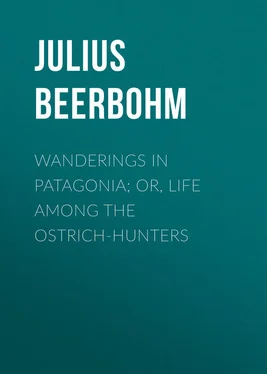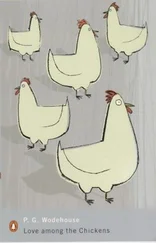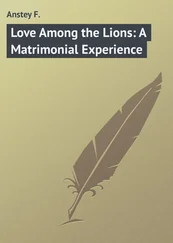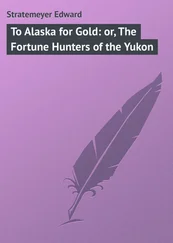Julius Beerbohm - Wanderings in Patagonia; Or, Life Among the Ostrich-Hunters
Здесь есть возможность читать онлайн «Julius Beerbohm - Wanderings in Patagonia; Or, Life Among the Ostrich-Hunters» — ознакомительный отрывок электронной книги совершенно бесплатно, а после прочтения отрывка купить полную версию. В некоторых случаях можно слушать аудио, скачать через торрент в формате fb2 и присутствует краткое содержание. Жанр: foreign_antique, foreign_prose, Путешествия и география, на английском языке. Описание произведения, (предисловие) а так же отзывы посетителей доступны на портале библиотеки ЛибКат.
- Название:Wanderings in Patagonia; Or, Life Among the Ostrich-Hunters
- Автор:
- Жанр:
- Год:неизвестен
- ISBN:нет данных
- Рейтинг книги:4 / 5. Голосов: 1
-
Избранное:Добавить в избранное
- Отзывы:
-
Ваша оценка:
- 80
- 1
- 2
- 3
- 4
- 5
Wanderings in Patagonia; Or, Life Among the Ostrich-Hunters: краткое содержание, описание и аннотация
Предлагаем к чтению аннотацию, описание, краткое содержание или предисловие (зависит от того, что написал сам автор книги «Wanderings in Patagonia; Or, Life Among the Ostrich-Hunters»). Если вы не нашли необходимую информацию о книге — напишите в комментариях, мы постараемся отыскать её.
Wanderings in Patagonia; Or, Life Among the Ostrich-Hunters — читать онлайн ознакомительный отрывок
Ниже представлен текст книги, разбитый по страницам. Система сохранения места последней прочитанной страницы, позволяет с удобством читать онлайн бесплатно книгу «Wanderings in Patagonia; Or, Life Among the Ostrich-Hunters», без необходимости каждый раз заново искать на чём Вы остановились. Поставьте закладку, и сможете в любой момент перейти на страницу, на которой закончили чтение.
Интервал:
Закладка:
But at this juncture somebody shook me, and I woke up, to find it was all a dream, and to remember that Magellan had been dead and buried for centuries, and that I, a son of the nineteenth century, had come to that spot, not to plant the true Cross, but to find what the country was capable of – and that, finally, it was time for supper.
CHAPTER II
The next morning we were up betimes. The weather was fine, and, as there was no wind, not too cold, though the taller hills were covered with snow, and the thermometer stood considerably below zero. Plenty of sea-birds were flying round the ship, or disporting themselves in the water, heedless of our presence; but on shore there were no signs of animal life stirring anywhere. Preparations were made for getting the horses on shore as quickly as possible, as their long confinement was beginning to tell injuriously upon them. In the meantime a boat was lowered, and, taking our guns, a few of us started off for the shore, to find some suitable spot to land the horses, and to have a general look round.
A short pull brought us in sight of a little cove, with a strip of sandy beach leading up to the mainland, which fell steeply down on all sides, so as to form a kind of natural corral, where the horses would be quite safe and conveniently sheltered from the wind. There we accordingly landed, roughly waking the echoes, which had doubtless been comfortably sleeping for many a long day, with a loud hurrah, as we jumped on shore and climbed up the bluff which shut in the cove. There the first object which met our sight was the little cairn, already mentioned, commemorative of Lieutenant Sholl. It was standing, probably, just as it had been left by the hands which reared it, as the Indians seldom, if ever, come so near to the port. The letters of the inscription were still tolerably visible, for the stones suffer little from the action of the atmosphere, and gather but few mosses or lichens in that dry climate, where, during nine months of the year, hardly any rain falls, and where all vegetation is stunted and scanty.
The view we obtained from our present standpoint was very limited, the horizon being bounded by a chain of conically shaped hills, flattened at the top, and generally similar in outline and height. The country which they enclosed appeared to consist of a series of irregular plains, broken up by glens, or 'cañons,' as they are aptly called in Spanish, with here and there an isolated hill and an occasional plain of short extent. There were plenty of bushes of a thorny species scattered everywhere, and in the glens the grass seemed to flourish in tolerable luxuriance, though on the higher-lying land it was less plentiful, the ground there being covered with pebbles of porphyry, worn round and smooth by the action of water at some remote period.
After our long cooping-up on board, we were not equal to any prolonged exertion, and soon got tired of climbing up the steep hills and escarpments, especially as there was no employment for our guns, either in the shape of beast or fowl. We therefore went back to our boat, to get at which, as the tide had already fallen considerably, we had to wade knee-deep through a long tract of black, slimy mud. As there is a tide-range at St. Julian of from thirty to forty feet, the ebb and flood tides rush in and out with great rapidity, and we often had great difficulty in pulling back to the ship, even with four oars, when the wind and tide happened to be against us.
The rest of that day was employed in getting the horses on shore, a task which was successfully accomplished before the tide commenced to rise again, so that they had comparatively little distance to swim to the cove. The poor animals seemed as glad as we had been to find themselves on land once more, and testified their satisfaction by neighing and frisking about with great vigour. In the evening we made a short excursion to Justice Island, close alongside of which we were anchored. Whilst exploring it we startled a large covey of shag, numbering quite a thousand, which, to judge by the accumulation of guano, appeared to roost there habitually. They did not fly up immediately at our approach, but waddled clumsily down to the beach, holding their bodies quite erect, and flapping their wings in a ludicrous manner. The sailors killed several with sticks, and subsequently cooked and ate them, notwithstanding the strong fishy taste of the flesh.
Early the next morning, together with two of my companions, I started on an expedition towards the interior, with a view to discover what kind of country lay beyond the range of hills which bordered the horizon. We took some provisions with us, as we did not expect to be home till the evening, thinking it prudent not to rely on our guns for our dinner, after the experience of the previous day of the absolute absence of game; indeed, we left them behind us, as being rather irksome on horseback.
Mounting the three freshest horses we could find amongst our stock, we struck off at an inspiriting gallop. We had not gone far, however, before it came to an abrupt ending. The plain over which we were riding suddenly terminated, descending into a deep ravine, which seemed to wind from the hills down to the port. The descent was rather steep, but we got down somehow; and then our horses had a hard climb up the opposite side, rendered still more arduous by the loose nature of the pebbly soil, which afforded no reliable hold, giving way under their feet. On reaching the top, we found ourselves on another plain, intersected a little further on by a ravine similar to the one we had just crossed and so we continued, now scrambling up and down these cañons, now leisurely trotting over short plains, whose level surfaces gave our horses time to get breath and to prepare for tackling the next ravine, until gradually we got nearer to the hills, beyond which we hoped to meet some more pleasant variety of landscape.
Presently we came to a very broad cañon, on the surface of which we observed some irregularities, which, on inspection, proved to be the remains of some human habitation. Portions of wall, about three feet high, were still standing, and here and there lay several pieces of timber; but, excepting a millstone, half embedded in the soil, there were no other vestiges of those who had once attempted to create a homestead in this lone spot.
The colony, on the site of which we were now standing, was founded in 1780 by Antonio Viedma, under commission from the Viceroy of the River Plate Provinces, and was abandoned in 1784, in accordance with a royal order, chiefly on account of the sterility of the soil, which rendered agriculture impossible. The colonists also suffered severely from scurvy, and were further troubled by the Indians, whose hostility they seem to have incurred. The Spaniards, whatever grave faults they may have committed in the administration of their South American possessions, developed great energy and spared no expense in their endeavours to colonise Patagonia, and numerous expeditions were despatched from Buenos Ayres with this object. Settlements were established at Port Desire and other spots on the coast, all of which, sooner or later, came to share the fate of the colony of St. Julian.
And indeed it is not to be wondered at. Unless some very cheap manure be discovered, by means of which sand may be profitably fertilised, or unless some new source of riches at present hidden be discovered there, it is much to be apprehended that Southern Patagonia is destined to remain almost entirely unpopulated and uncultivated till the end of time. In the cañons, where there is a little alluvial soil, some scanty crops might be harvested, or a patch of potatoes might be cultivated; but the spring and summer months are so dry, that even these limited attempts at husbandry might not always be attended with favourable results. Sheep might be reared in the valley of the Santa Cruz River, though not in great numbers, as the pasturage there is rather limited, and the grass itself is coarse and long, and not particularly adapted for sheep, for which it is preferable that it should be short and fine.
Читать дальшеИнтервал:
Закладка:
Похожие книги на «Wanderings in Patagonia; Or, Life Among the Ostrich-Hunters»
Представляем Вашему вниманию похожие книги на «Wanderings in Patagonia; Or, Life Among the Ostrich-Hunters» списком для выбора. Мы отобрали схожую по названию и смыслу литературу в надежде предоставить читателям больше вариантов отыскать новые, интересные, ещё непрочитанные произведения.
Обсуждение, отзывы о книге «Wanderings in Patagonia; Or, Life Among the Ostrich-Hunters» и просто собственные мнения читателей. Оставьте ваши комментарии, напишите, что Вы думаете о произведении, его смысле или главных героях. Укажите что конкретно понравилось, а что нет, и почему Вы так считаете.












